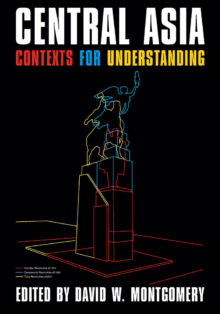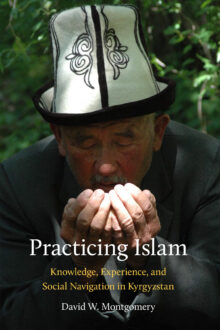
David W. Montgomery
David W. Montgomery is research professor in the Department of Government and Politics and the Center for International Development and Conflict Management at the University of Maryland and director of program development for CEDAR—Communities Engaging with Difference and Religion. His books include Practicing Islam: Knowledge, Experience, and Social Navigation in Kyrgyzstan; Living with Difference: How to Build Community in a Divided World; and Everyday Life in the Balkans.
Central Asia
Contexts for Understanding
Honorable Mention, 2023 CESS Outreach Award
Central Asia is a diverse and complex region of the world often characterized in the West as exotic, remote, and difficult to understand. Central Asia: Contexts for Understanding offers the most comprehensive introduction to the region available for students and general readers alike. Combining thematic chapters with detailed case studies, readers will learn to appreciate the richly interconnected aspects of life in Central Asia. These wide-ranging, easy-to-understand contributions from many of the leading scholars in the field provide the context needed to understand Central Asia and presents a launching point for further reading and research.
Practicing Islam
Knowledge, Experience, and Social Navigation in Kyrgyzstan
David W. Montgomery presents a rich ethnographic study on the practice and meaning of Islamic life in Kyrgyzstan. As he shows, becoming and being a Muslim are based on knowledge acquired from the surrounding environment, enabled through the practice of doing. Through these acts, Islam is imbued in both the individual and the community. To Montgomery, religious practice and lived experience combine to create an ideological space that is shaped by events, opportunities, and potentialities that form the context from which knowing emerges. This acquired knowledge further frames social navigation and political negotiation. Through his years of on-the-ground research, Montgomery assembles both an anthropology of knowledge and an anthropology of Islam, demonstrating how individuals make sense of and draw meanings from their environments. He reveals subtle individual interpretations of the religion and how people seek to define themselves and their lives as “good” within their communities and under Islam. Based on numerous in-depth interviews, bolstered by extensive survey and data collection, Montgomery offers the most thorough English-language study to date of Islam in post-Soviet Kyrgyzstan. His work provides a broad view into the cognitive processes of Central Asian populations that will serve students, researchers, and policymakers alike.


